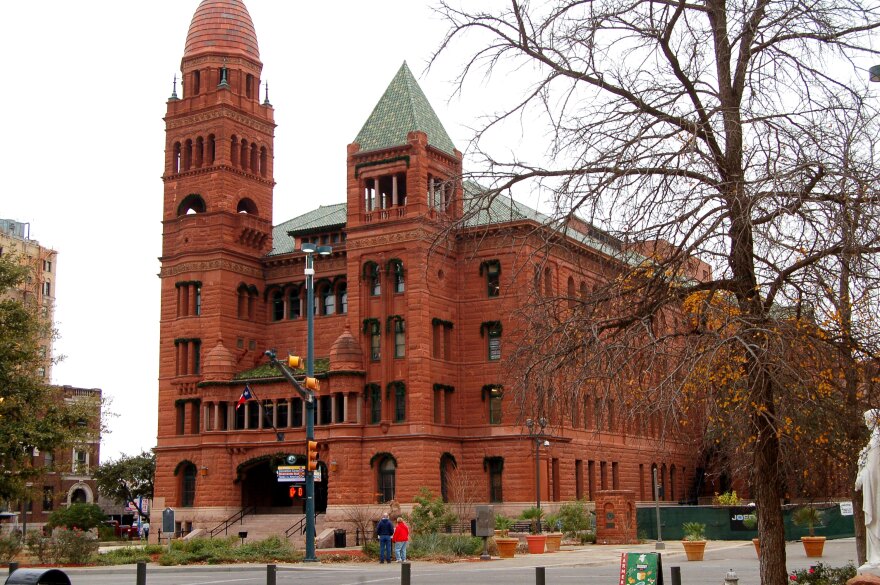Bexar County Sheriff Javier Salazar briefed county commissioners this week on his long-term plans to reduce huge overtime costs for staffing the jail.
The county spent $10 million on overtime in 2020, according to the county manager’s office.
Salazar on Tuesday pitched perhaps the biggest proposal of all to reduce the jail population and associated overtime for the jail staff — the creation of a mental health facility to house and treat eligible inmates.
“Use that as a means of taking care of them other than trying to rely on our jail as a long-term solution to our ongoing mental health and growing mental health crisis,” he said.
County Judge Nelson Wolff said he supports the idea as long as it’s not under the thumb of the Texas Commission on Jail Standards.
Bexar County Commissioner Tommy Calvert said he would support such a facility if it had a campus atmosphere and was not just a second jail.
Salazar said retaining detention deputies is the biggest challenge to ending expensive overtime operations. He said a four-day work week will be implemented to lure more millennials into detention services. And he said recruitment of military veterans is another focus.
The jail ended 2020 with around 250 openings for detention deputies.
New County Commissioner Trish DeBerry suggested a consultant or task force look into management of the jail. Salazar told her there was not a lack of management.

“I think there is,” DeBerry told the sheriff.
She voted against payment of the most recent overtime bill from the sheriff of more than $2 million. The other commissioners voted yes and the motion passed.
Action to address growing domestic violence and homelessness
In other action, commissioners approved a funding request from District Attorney Joe Gonzales to address the growing number of family violence cases.
Commissioners approved $350,000 to pay two misdemeanor prosecutors, a felony prosecutor and a paralegal to tackle the backlog in the county courts.
Gonzales said domestic violence skyrocketed in 2020, and a flood of cases are headed to court.
“Locally, we have seen an uptick of 18 or 19% according to law enforcement. We know at some point we are going to have to deal with all those cases,” he said.
Gonzales said requests for protective orders jumped 197% in the past year. Court proceedings have been mostly virtual since March because of the pandemic.
On another agenda item, Calvert called on organizations that receive county funds to reduce homelessness to step up their assistance efforts as the pandemic leaves more people in the streets.
Calvert made the comments as commissioners approved a $1.4 million grant for the Salvation Army.
Calvert distributed images at the meeting of a homeless camp of 60 people under the Nolan Street bridge, not far from the Salvation Army.
Calvert grew concerned after the Salvation Army’s Director of Social Services Robert Galan said his personnel do not visit homeless camps.
“The $1.4 million that the staff is recommending is a lot of of money for us to give for homelessness for me to hear you say that’s not our niche,” Calvert said.
Galan said outreach to homeless camps is done by others.
He further clarified to say local assistance organizations work to compliment each other's services because of limited available dollars.
Galan said the grant will be spent on homeless prevention, new beds, and improvement to its men’s shelter.
Commissioners also approved $256,000 dollars for Haven For Hope.
Wolff said the county will also pump $2 million into the city’s rental assistance program.

The San Antonio Stock Show and Rodeo will continue in a scaled-down event
In other action, commissioners approved a grant of slightly more than $741,000 to the San Antonio Stock Show and Rodeo to help save more than 500 scholarships to local students.
The stock show and rodeo was hit hard financially by the pandemic. The scaled-down event at Freeman Coliseum runs from Feb. 11-28. The event will be held at 46% capacity, which is about 4,000 people according to a rodeo spokesperson.
Wolff said he had confidence in the event’s efforts against becoming a super spreader. He said the county has learned much from the city’s ability to stage large events at the Alamodome.
COVID-19 protocols will be enforced on the stock show and rodeo grounds, including mask wearing and social distancing.
Calvert said the rodeo should look into rapid COVID testing kits for visitors on top of the existing protocols.
The indoor rodeo has been moved from its home inside the AT&T Center to its previous home in the coliseum for this year only.
Rodeo officials said the rodeo will take on a retro look of the 1950s with videos of singing movie and television cowboy Roy Rogers, and his wife, Dale Evans, who emceed a rodeo from the coliseum on national television in 1955.
Rodeo shoots will be wooden in appearance and rodeo sponsors plan to display vintage ads at the coliseum.
The post rodeo concert series will be held this year, but is primarily open to season ticket holders.
TPR was founded by and is supported by our community. If you value our commitment to the highest standards of responsible journalism and are able to do so, please consider making your gift of support today.


